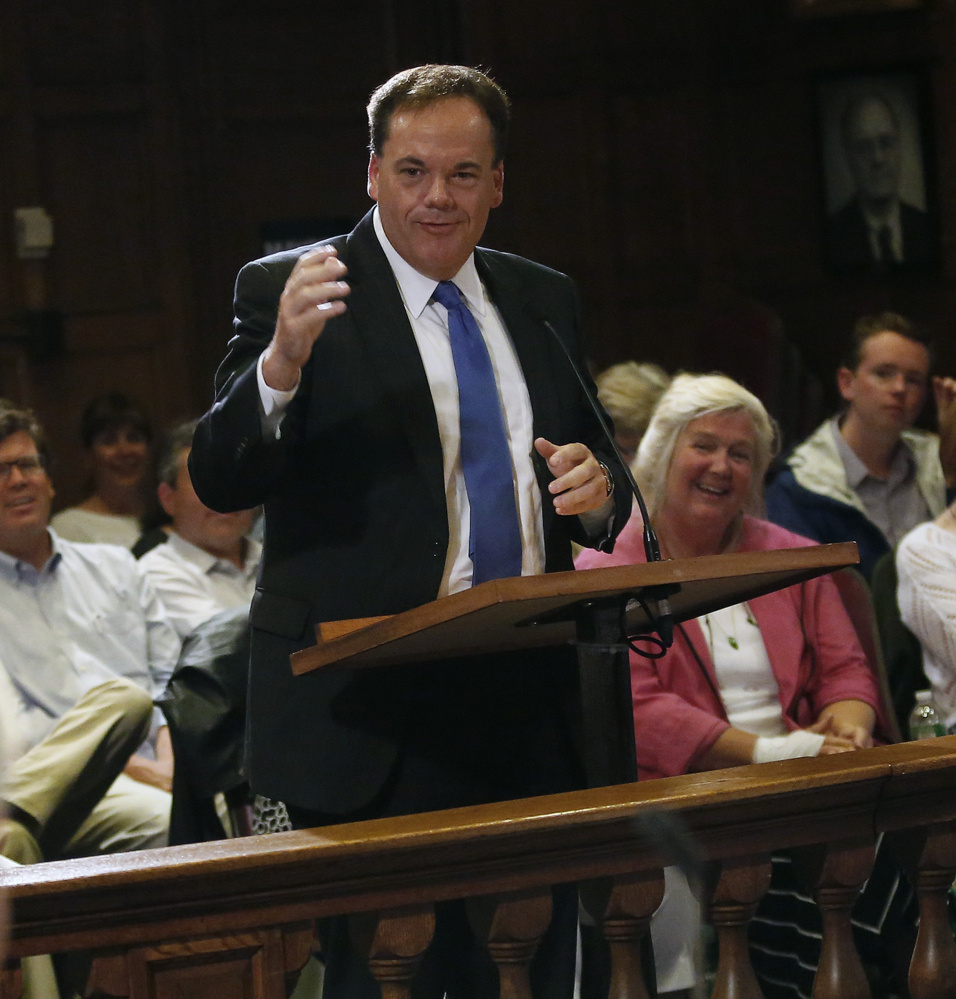Portland City Manager Jon Jennings on Wednesday will propose a $240 million municipal budget for the fiscal year beginning July 1 that would increase staffing but leave unanswered the question about whether the city will provide public assistance to asylum-seeking immigrants who may be cut from the state’s welfare program.
The municipal budget would increase property taxes for non-educational services by 2.5 percent, adding about $65 to the annual tax bill of a home assessed at $240,000.
Jennings’ budget would bolster community policing in the Bayside and Parkside neighborhoods, shift maintenance of school facilities back to the school district and include $250,000 to begin the first wave of pay increases for about 175 nonunion city employees. It would also add staffing to the city’s parks department.
It includes an increase to city parking fees of 25 cents an hour, bringing the hourly rate to $1.25. That could generate $600,000 more in revenue and allow the city to roll out a mobile application that would allow people to receive text/email alerts as their tickets expire and purchase more time remotely.
“This continues the effort we put forward last year to refocus city government on what we’re uniquely responsible to be doing,” Jennings said in an interview. “It’s not everything the city needs at this point, but it’s what we can afford.”
Jennings is expected to present his budget, which includes $2.3 million in contractual salary increases, to the City Council on Wednesday, kicking off a monthlong review. He discussed the proposal with the Portland Press Herald on Tuesday.
Among the issues facing the council is how to help as many as 180 asylum seekers who may be cut off from state funding over the next fiscal year. Jennings’ budget does not include full funding to continue the aid, but it is expected to be a focus of attention during the council discussions.
Mayor Ethan Strimling declined to answer specific questions about the budget proposal on Tuesday, only calling it a “good foundation” that includes many of his and the council’s priorities. Those priorities include staffing the newly created Office of Economic Opportunity, which was created by the council last year to help better integrate people of color and new Mainers into the community.
Strimling applauded efforts to increase the diversity of the city’s workforce, including the hiring of a diversity and inclusion specialist in the city’s Human Resources Department.
Otherwise, Strimling said he would address the issue of asylum seekers losing General Assistance, as well as other specifics, in his budget comments, to be delivered on Wednesday.
“I will be talking about the fact we have to address (General Assistance) and that we can’t just ignore the problem,” said Strimling, who clashed with Jennings last year over the budget. “We have to make sure we don’t allow people to be put out on the street. We have to find the answer, but I don’t know what the answer is yet.”
City officials estimate that it could cost between $750,000 and $950,000 to provide financial help to the affected asylum seekers, who come to the U.S. legally and seek to stay here out of fear of being harmed back home. Asylum seekers have to wait six months after filing their asylum application to be able to work and often rely on General Assistance to meet their basic needs for food and housing. It can take years before their cases are adjudicated.
The budget includes $250,000 to help immigrants excluded from the state GA program, but Jennings said councilors need to make a policy decision about whether to fund assistance to asylum seekers who may be termed out by a 24-month cap enacted by the Legislature two years ago.
Danielle West-Chuhta, the city’s top lawyer, has questioned whether public funds can be used to help those who are termed out of the state program without violating federal law. The council may receive her legal opinion in a closed session, rather than in a public memo, said Jessica Grondin, the city’s communications director. Such a move would signal concern about a possible legal challenge, should the city move forward with providing the aid. A previous legal battle with the state Department of Health and Human Service cost Portland roughly $3 million.
Elsewhere, the budget adds about 17 full-time equivalent positions to the city payroll.
Four additional police officers will be assigned to the community policing programs in Bayside and Parkside neighborhoods, areas that are home to a collection of social service agencies and homeless shelters and are hard hit by drug use. One officer is being reassigned, while three others are being added.
Four new positions – two inspectors and two support specialists – are being added to the Permitting and Inspections Department, which anticipates a $570,000 increase in revenue from building permits. And three new positions – a horticulturist, arborist and playground technician – are being added to the parks department.
The budget includes $50,000 to help pay for sound monitoring equipment to measure sound levels throughout the city from outdoor summer concerts on the Maine State Pier and other venues. Jennings said the concert promoter, Waterfront Concerts, as well as other area businesses concerned about sound, will also be asked to invest in the roughly $170,000 system, which would track decibel levels in real time.
The budget also eliminates nine positions. Six positions in the school-based oral health program were eliminated, since that program was transferred last year, along with the city’s HIV-positive program, to Greater Portland Health. And three other public health positions were eliminated due to the loss of $416,000 in state grants.
Jennings said the STD testing and needle exchange programs at the India Street Public Health Center were “fully funded” in his budget.
Additional money has been allotted to the planning department to hire a new staffer and consultant to rewrite the city’s land use code.
Over the last year, Portland’s valuation has increased by $20 million because of real estate development, leading to an additional $422,000 in revenue at the current property tax rate of $21.11 per $1,000 of valuation. That’s down sharply from the previous year, which saw a $68 million increase in value, leading to an additional $1.4 million in property tax revenue.
The budget also anticipates a $400,000 increase in revenue from the cruise ship industry, which brought more than 200,000 people to the port last year, according to the city.
In addition to municipal spending, county taxes and the school budget also factor into the city’s overall property tax rate. This year, the City Council set a goal of limiting tax increases to 2.5 percent.
Last week, the Board of Education’s Finance Committee endorsed a $104.8 million budget that met the council’s guidance of a 2.5 percent increase. That plan, which is expected to see a vote by the board on April 11, is $2.2 million less than the budget proposed by Superintendent Xavier Botana.
Meanwhile, Portland’s tax assessment to Cumberland County government will increase by 9.1 percent, or $490,600, to a total of $5.9 million. That increase is included in Jennings’ budget.
Correction: This story was updated at 8:15 a.m. on April 5 to correct the amount of the municipal budget in the summary under the headline.
Randy Billings can be contacted at 791-6346 or at:
Copy the Story LinkSend questions/comments to the editors.





Success. Please wait for the page to reload. If the page does not reload within 5 seconds, please refresh the page.
Enter your email and password to access comments.
Hi, to comment on stories you must . This profile is in addition to your subscription and website login.
Already have a commenting profile? .
Invalid username/password.
Please check your email to confirm and complete your registration.
Only subscribers are eligible to post comments. Please subscribe or login first for digital access. Here’s why.
Use the form below to reset your password. When you've submitted your account email, we will send an email with a reset code.